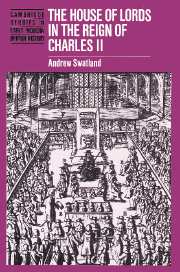Book contents
- Frontmatter
- Contents
- List of tables
- Acknowledgements
- List of abbreviations
- Note on the text
- 1 Introduction
- PART 1 FROM ABOLITION TO RESTORATION
- PART 2 MEMBERS AND THE BUSINESS OF THE HOUSE
- 3 Membership, attendance and privileges
- 4 Legislation
- 5 Justice
- PART 3 KING, LORDS AND COMMONS
- PART 4 RELIGION
- PART 5 POLITICS
- Appendix 1 Temporal members of the House of Lords
- Appendix 2 The bishops, 1661–1681
- Index
- Cambridge Studies in Early Modern British History
- Frontmatter
- Contents
- List of tables
- Acknowledgements
- List of abbreviations
- Note on the text
- 1 Introduction
- PART 1 FROM ABOLITION TO RESTORATION
- PART 2 MEMBERS AND THE BUSINESS OF THE HOUSE
- 3 Membership, attendance and privileges
- 4 Legislation
- 5 Justice
- PART 3 KING, LORDS AND COMMONS
- PART 4 RELIGION
- PART 5 POLITICS
- Appendix 1 Temporal members of the House of Lords
- Appendix 2 The bishops, 1661–1681
- Index
- Cambridge Studies in Early Modern British History
Summary
The chief function of parliament in the seventeenth century was the enactment of legislation. This aspect of parliament has been neglected by most historians of the period. Scholars of the Restoration period have focused instead on the political and constitutional aspects of parliament, and especially those of the House of Commons. Yet in the reign of Charles II both Houses devoted more time to legislation than to any other business. Over 900 bills were read in the upper House between 1660 and 1681 – approximately twice the combined number of judicial and privilege cases proceeded with by the House. Two central questions will be addressed in this chapter. First, how did the House process legislation? Secondly, what was the House of Lords' contribution to the legislative process for the reign as a whole?
The House of Lords dealt with both public and private bills. Public bills, comprising a third of all bills read in parliament, were those which concerned the nation as a whole, or at least a sizeable section of it. They included bills for the benefit of the church, trade, the poor and any which concerned the ‘person, revenue, or household of the king, queen or prince’. Private bills, in contrast, were those intended to benefit individuals or specific interest groups. Promoters of private bills incurred the payment of fees to the clerk, his assistants and to the gentleman usher. In the Lords a private bill normally started from a petition signed by the interested parties.
- Type
- Chapter
- Information
- The House of Lords in the Reign of Charles II , pp. 50 - 70Publisher: Cambridge University PressPrint publication year: 1996



